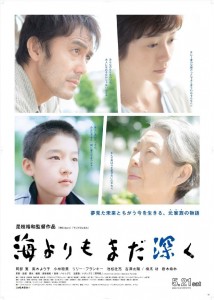“After the Storm” – Film Review from 20th JFF (Australia)
Review by Eden Law (ALT Fukushima 2010-2011), from the 20th Japanese Film Festival in Australia. Currently president of JETAANSW, and Country Representative for Australia.
‘After the Storm’ featured as the opening night film for the 20th Japanese Film Festival (JFF) nationally in Australia. This slice-of-life episode in a family’s story is another wonderful example of Kore-eda’s skillfull storytelling of the dysfunctional family dynamic. Where other films in this genre might occassional use confrontational arguments for conflict and drama, or cynically exploit these conflicts for comedic effect, Kore-eda adds a deeper emotional layer of melancholy and gentleness that makes his characters sympathetic, for all their faults and questionable motives.
Abe Hiroshi plays Ryota, a one-hit wonder author who has been trying to come up with his next novel for almost 15 years, while working as a seedy private detective, scraping together cash by blackmailing clients and rummaging through the belongings of his mother, Yoshiko (Kiki Kirin) for things to pawn for cash. Ryota is the very picture of a dead-beat dad – barely able to pay child support, he still wastes it all on gambling, even when his increasingly exasperated ex-wife, Kyoko (Maki Yoko) threatens to cut off access to his son, wise-beyond-his-years Shingo (Yoshizawa Taiyo). His sister (Kobayashi Satomi) is similarly at the end of her patience with Ryota, although like their mother, she is indulgent with the once-bright star of their family.
The storm in the movie title is a typhoon that maroons the fractured family together at Ryota’s mother’s apartment, forced into a temporary reunion that delights Yoshiko and Shingo, but creates an uncomfortably close and intimate situation for the former married couple. In this small space, emotions and memories, both good and bad, emerged, but it also provides a chance for much-needed frank discussion, not just between Ryota and Kyoko, but between all the characters.
‘After the Storm’ isn’t as concerned about a conventional resolution storyline, but rather about the interaction and tension of family (or ex-family) connections. In bringing out the complexities of these interactions, the actors do a superb job: Abe is able to show the vulnerabilities of his character to create someone who is not a total jerk – an immature man-child yes, but someone who feels his sense of failure constantly, and desperate not to screw up with his son, which is the only thing he hasn’t destroyed yet in his life. Maki plays Kyoko as a direct contrast with Ryota – tense and upright in her bearing, determined to firm with her feckless ex-husband, but also to suppress whatever feelings she may still have for him. Kiki completely delights as the sassy mother to Abe’s Ryota in a mother-son dynamic that is done with such ease and naturalness that it is one of the highlights of the film; and ultimately she proves to be the wise and emotional core of the film, understanding all too well how her son’s faults have caused things to end up the way they have. And paired with Yoshizawa’s Shingo, the actors provide some of movie’s most emotionally affecting moments, as Shingo’s simple and honest sensitivity provides much-needed empathy and compassion for his neglected grandmother.
Enjoyment of ‘After the Storm’ lies in experiencing the truths to be found in the conversations of Kore-eda’s script, and while no fairy-tale ending is to be found, ends with the possibility of reconciliation (not in the conventional sense) and hope.
After the Storm (Umi Yorimo Mada Fukaku) by Hirokazu Kore-eda, released May 21, 2016, starring Abe Hiroshi, Kiki Kirin, Maki Yoko, Yoshizawa Taiyo, Ikematsu Sosuke, Lily Franky, Kobayashi Satomi, Hashizume Isao.



Comments are closed.